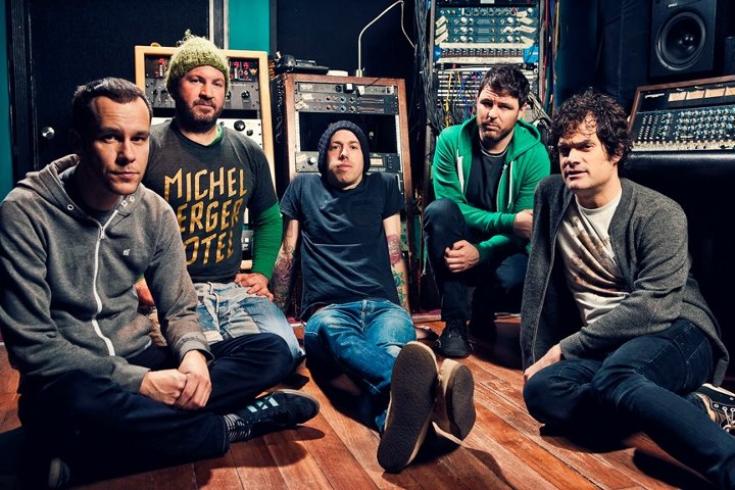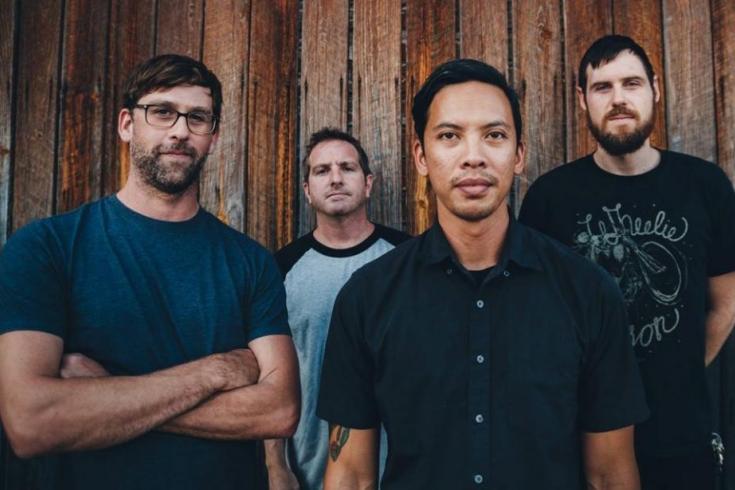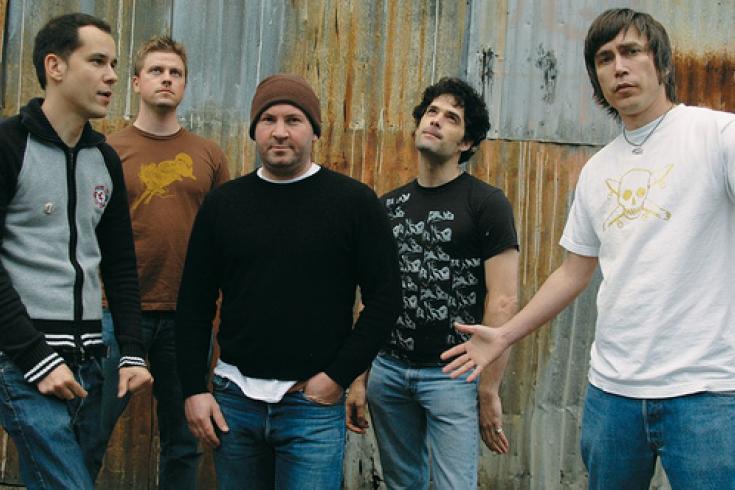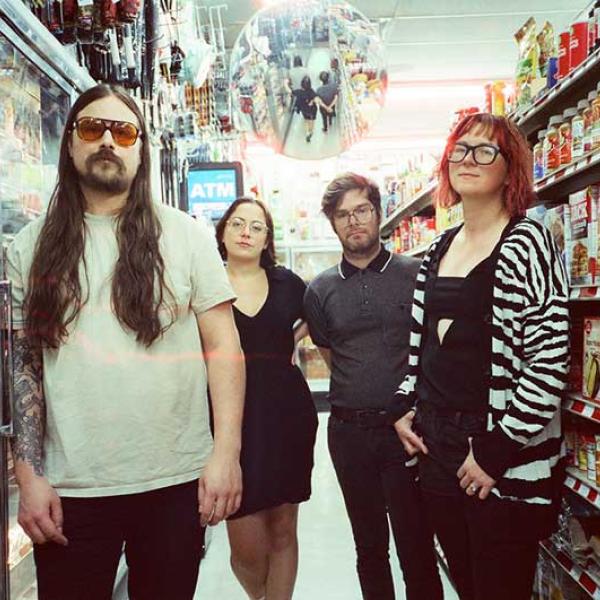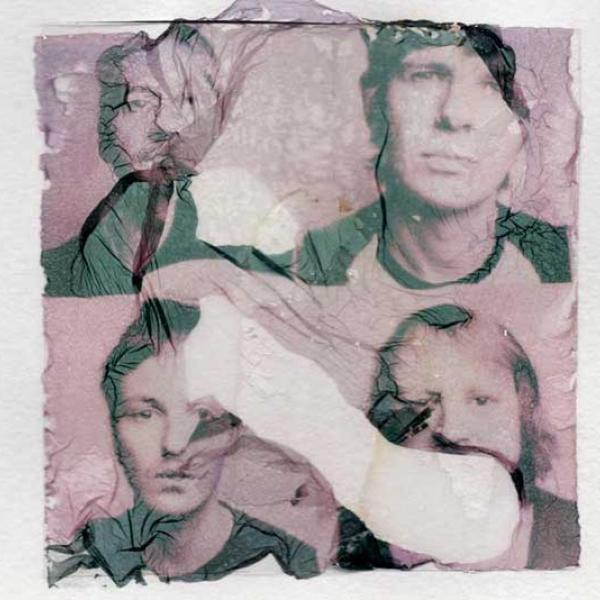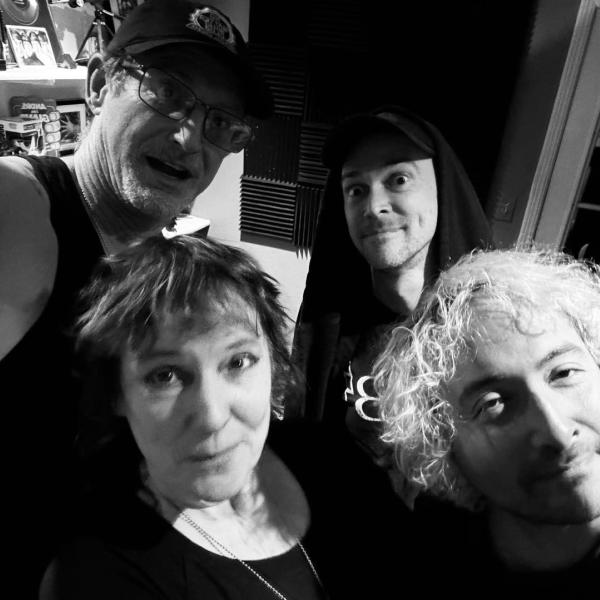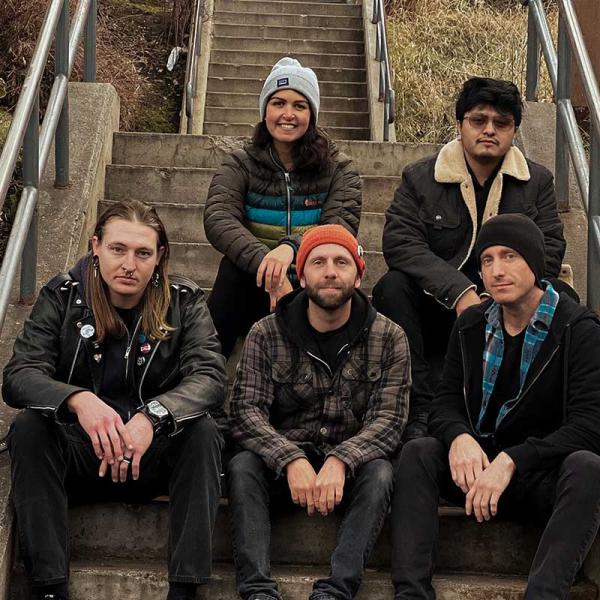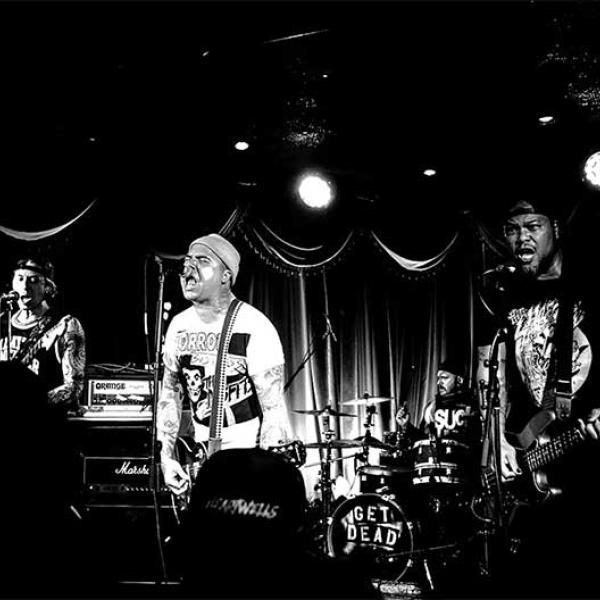Features
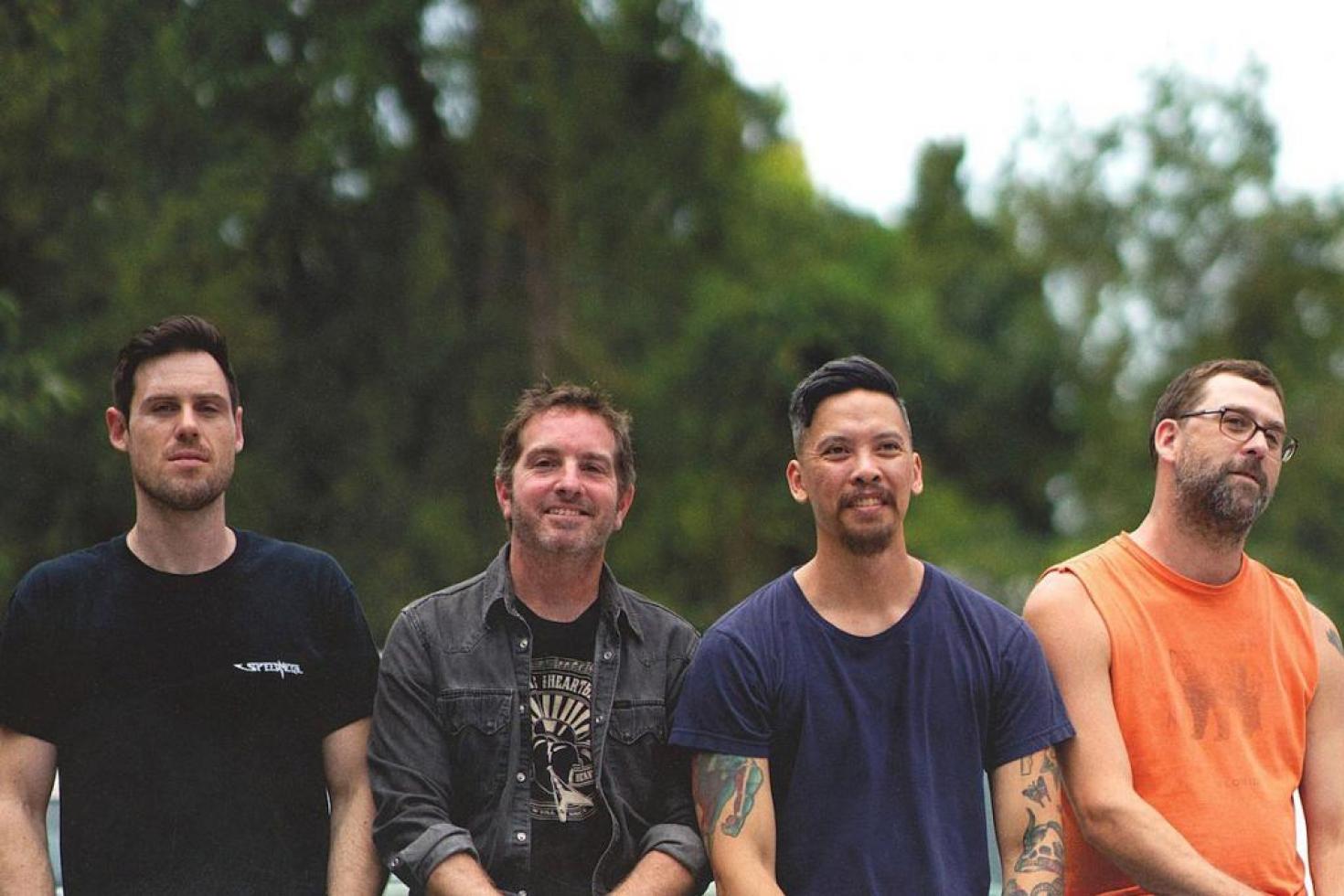
Ship Thieves recently released 'Irruption' via The Bouncing Souls' Chunksaah Records. On the band's first new album in five years, Hot Water Music's Chris Wollard, bassist Chad Darby (Samiam), guitarist Addison Burns (Quit, The Enablers), and Bobby Brown (The Enablers) burn through ten songs that sound instantly familiar. To borrow from Wollard’s other band, there’s just something about those trusty chords that feels like coming home. Yet the band also continues to build on the sound they established on their previous albums with ragers like 'The Embers of Enlightenment' and the surprising 'Hercules Stomp'.
We caught up with Chris and Chad to talk about the new album, art versus deadlines and being a dysfunctional band.
PRT: There's never any doubt that I will like a new Ship Thieves album, but you still managed to throw in a couple of new things, unexpected things on ‘Irruption’.
Chris: Yeah, I don't know. I was trying to have fun in the studio, right? Just spin it, have fun with it.
PRT: Did you record the album almost three years ago?
Chris: I don't really know. But we didn't do it all at once. It took a while. That's generally how Ship Thieves do it, because we're poor. So you do a little bit at a time. But it's been... I mean, it was pretty much recorded for a while and then it took us a while to mix it. And then for some reason it took us a while to master it. And for one reason or another yeah, it took a long time.
PRT: And is it just the way that Ship Thieves operate or does it also have to do with you taking a break from Hot Water Music?
Chris: No, Ship Thieves is a dysfunctional band. Fully dysfunctional. It has always taken us a long time to record and I don't know why that is. I was talking to the engineer a couple of weeks ago and we were laughing, because when we started this record one of the things we all agreed on was that it wasn't going to take us two, three years to finish it, because it always does.
And so here I am, three years later and I'm delivering a copy to the studio in vinyl, but whatever.
Part of it was me taking time off, for sure, but not a lot of it. Maybe six or nine months. There's many reasons why. Money. Me. But we also lost our label part way through. So we had to rethink that. We talked to a couple of labels, we thought about doing it ourselves. We did need to take a step back and kind of decide what it is we wanted to do. And then once that all got going, there's still a lot of legwork to do.
But it's really just Ship Thieves being dysfunctional. We always do everything completely backwards. It's more like guerrilla warfare. There's no real, great formation, there's no plan. We're just kind of in the woods trying to figure it out. With Hot Water Music we have way more deadlines, but that's also because Ship Thieves is usually not such a big deal.
PRT: And is that your preferred way of doing things? Or is it also a comfortable way of working, like with Hot Water Music where it's more structured and you know how long things will take?
Chris: I like to keep it pretty loose. I change my mind a lot when I'm working, because it's not like building a house. It doesn't have to be done any certain way. You can do things weird. You can do things that don't make sense.
Take ‘Virulent Man,’ that used to be a different song. It got completely rewritten. And that's not the first time that's happened with this band. We mess with stuff a lot. It's good to leave yourself some time to have fun with it and explore your ideas. And a deadline is fine, but a deadline can be really stressful. And so with Ship Thieves, I like having it be really, really loose where we can kind of play whatever we want.
When you're doing art, trying to work in a perfectly straight line where you go from point A to point B is unrealistic a lot of the time. Sometimes we have songs and we're like, "Yes, this is going to be great" and then we go “Wait, those couple songs aren't very good at all. We need to keep writing.”
You know there's that saying, man plans and God laughs, right? I think that that's true. You can only plan so much. So with a band like Ship Thieves we just do whatever we want. We might go to the warehouse and spend two hours throwing darts and 20 minutes playing music, but that's fine. That's just the way that the band has evolved. If it was too structured, it might not feel like the same band.
PRT: So then once the album was recorded…
Chris: Well, then you have to mix it which is a huge thing that changes your record a lot. And then you have to go through the weird process of mastering which we all feel like is a myth or something. It's like, do I still believe in this? When you leave the studio you kind of go, “Okay, it's mixed, that's what it's going to sound like.” But then no, it goes to some other guy.
And then you are also dealing with the art, which can be a big part if you are working with an artist because you want it all to work as one piece.
We say it's not final until it's vinyl. Once the records are at your house, then it's over. But I've had it happen in the past where we go to test press and there's this many songs on it and then somebody says, "I don't really want to put those songs on it anymore." And then you have to send out for another test press and now there's ten songs instead of 13. So yeah, it's not final till it's vinyl. And you stress out about it until that day.
And you keep messing with stuff even then, you really do. Like the first record we all did together, ‘Canyons,’ we're thinking about remixing that. We've already remixed a few songs and it sounds way better. You keep thinking about it, you really do, because... I don't know, it's art, so you should be able to look after it.
PRT: Yeah, art and deadlines don't seem like two things that work together particularly well.
Chris: It's a thing you have to learn, for sure. But really the deadline is because it's not just the four of us. It's not just the four of us and Ryan (Williams, producer). It's also the artist. It's also the label who is investing time and money into it. And then there’s PR guys, managers and booking agents. So sometimes the deadline is really important, because everybody has to know for the next year this is what everybody needs to be doing.
Ship Thieves is way more grassroots and that’s what I like about it. When Kate from Chunksaah and I agreed to do this together she asked me why I wanted to do this with her and she goes, “I'm not like a real label." And I was like, "Well, that’s perfect because we're not a real band."
But we had to tell ourselves we're not necessarily approaching this as an album, but more like an art project. And hopefully it's fun and hopefully it goes well. But we didn’t want no big campaign to get it around the world. It's just, we're going to do it, we're going to put it out there for the world and hopefully it's all fun so that we can do it again.
PRT: And now that the album is out, do you still have the same level of excitement or is it more like, oh yeah, it's out now?
Chris: It's kind of like a relief. Or a pressure release. You can exhale. Like phew, that's done. You have this period for probably a month or two where you feel it’s awesome and it feels great. But you're also very immediately starting to think about what's next.
Because it's not like the whole point was to make that record. There's going to be another record. There's going to be new songs. So you don't take very long to pat yourself on the back. You take a little bit of time to let your mind clear and then you're fixated on what's in front of you. It's always more exciting to think about the songs you're working on than the ones you've already finished.
In a couple of months we're going to be recording a new Hot Water record and by the time that's done I expect we'll have some new Ship Thieves songs. You just keep working because the process is what's fun about it. Being in the warehouse, that's fun. Being in the studio, that's fun.
So the more you can do that, the better and you just have your fingers crossed that you're going to come up with some good stuff that you like. And that's about it. You can't have high hopes. You know it's an angry punk rock record. You do that kind of stuff because you're compelled to.
PRT: Isn't it weird to... You record an album, you release the album and then by the time that fans get to hear the music, you are already on to the next thing.
Chris: Oh yeah, and it's always been that way. As long as Ship Thieves has been together, we were playing shows where we weren't really playing the songs that anybody knew. We would play full shows of all new material that you haven't heard.
PRT: I remember a show like that where I was like, "Wait, I know I have heard the albums, but there was only one song I knew”.
Chris: Yeah, but that's how it's always been. I didn’t really want to play a show to sell records. I wanted to play a show so that I could be getting tighter with my band. Ideally you do that before you get in the studio. But yeah, it’s something people used to complain about all the time. Why aren't you playing anything I know? And it's like, because these new songs are better, that's why.
Chad: Because we can.
Chris: And also, we forgot them. (laughs) But yeah, that's why I've always liked the warehouse and the studio better than being on tour. It's the same with every band I've ever been in. In Hot Water they have this problem every time a new record comes out. Because they go out on tour, they play showsand out of the 20 songs they play, probably 15 or 16 of those are old.
So you just put out a 12-song record, but chances are you're only ever going to play five or six of those songs, ever. And that is irritating to me. I get what people at shows want. I mean, if I go see Guided by Voices, I want to hear my favorite songs too. But I also understand that it just gets so boring. And with this band it was always, man, who cares? Let's just play what we're good at. And what we're good at right now is the stuff we've been working on. That's like a weird line that every band in the world has to figure out.
PRT: Yeah, do you want to please yourself or do you want to please the audience?
Chris: Yeah, what's the ratio of that? I guess that's why bands do quote, unquote album shows. It's like o, maybe if we do this, then we don't have to do it for a while. That would be my opinion of why they would do it. It's a hard thing to figure out.
I always figured when we were playing shows nobody knows who we are anyway. Which was totally true. People might know a song or two, but they didn't really know anything about what we were doing. So I didn't really care. It was like let's just give them what we got. Let's just play our asses off.
Chad: We were never a band that had any kind of defined single or a popular song. We didn't really play that many shows, we didn't tour that often. So whenever we played shows, it wasn't very tough for us to make the decision to play all the new stuff. It doesn't seem like the audience really should care too much, because it's not like oh, there's some crowd favorite song that everyone wants to hear or something, right?
Chris: We don't have one.
Chad: Yeah, we don't have that. So let's just play our songs we're excited about playing. We've been working on this one in the warehouse and it sounds really cool, let's play it in a club out of really loud speakers.
PRT: Chad, do you have the same thing with Samiam? There it seems like you're just happy to play a show again together.
Chad: Yeah, for sure. We're all very happy just to play shows. As far as Samiam and new songs, it's like what Chris was talking about with Hot Water. People don't really want to hear a bunch of new Samiam shows. If Samiam is going to play 15 songs at a concert, you want to hear the 15 songs that you know from the 12 records they have.
Sergie (Loobkoff) is a very prolific songwriter and so there are just a lot of songs. But people will have a very defined amount of songs that they want to hear. Samiam is writing a record right now and I'm sure we're going to be playing those songs live. But I don't know if the crowd is necessarily like, oh, I want them to play the whole new record. They're probably like maybe they can play one of the new songs, but I want to hear all the stuff from ‘Astray’ (laughs).
Chris: Yeah, that's stuff that you try not to think about too much, because that can kind of bum you out. It can also affect the studio if you don't watch out. Because you have to give every song a fair shot. You have to work equally on all of them. Even if you know that in the case of Samiam and Hot Water, there will probably be some singles getting pushed or whatever. So you know you might have to play that song. And then you're like, "Goddamn, I worked on this other song for four months".
There are Hot Water songs that never got played live. Just when's it going to happen? And there's Ship Thieves songs that probably have never been played live. I remember when we were in Europe and people would ask why we weren’t playing ‘Reason In My Rhyme’. And I'm like, "Because I brought my electric. That's why." I mean, I can't really finger-pick through a Marshall amp and have this sound right. That's just not going to happen.
That’s another thing. Acoustic versions of your songs. Obviously, it got really popular all over the world, but when I get asked why I don’t do that, it's like, I fucking hate that. That's why. The song was written with a bass player and a drummer. Some songs you can get away with doing that, but you're taking more than half the band out of it. And then you got, what do I do during this guitar solo? What do you think? Should I whistle it? Should I get a harmonica? Because I don't fucking play harmonica. I don't know. I like to just keeps things the way we wrote it and I'm always way more fixated on what's in front of me than what's behind me. For sure.
PRT: You said about the new album that you wanted the songs to work together and paint a picture with different scenes. Do you approach writing lyrics the same way you would a short story?
Chris: Yeah, I think so. I definitely try to arrange my words in more of a prose style. Which you can't always do, but I try not to pay attention to where the end of the line is rhythmically. I try to just make sure my words fit together. It's hard to say that it's really like a short story. But it's closer to a short story than it is to poetry.
But you're still regulated to parameters, right? A short story can go anywhere you want. The rhythm can go any way, up, down. It don't matter. And you can spend ten pages talking about a rock on the ground if you want. But with a song you are restrained. You're confined in a similar way to poetry, maybe even more so, because there's music to it.
And there's pitch. So I have to write something that I can sing, first of all. But you also have a meter that dictates how fast it goes. And you also only have two to three minutes. I think about it like a Rubik's cube or something. It's all here, but you have to turn it around and you got look at it from every angle to make sure it fits. And sometimes those constraints get too tight.
When I finish a song, I know it's about this subject. And this part of it I've done, but there's still other aspects that I need to get out. So you end up writing other songs to back up or to finish your thought. It helps having an album to work with. Sometimes I finish a song and I know exactly what it is about and it makes perfect sense to me. But then I go and I read it and I'm like, nobody's ever going to fucking know what this is about.
Because I run out of time. Or I'm trying to describe one part, but that means I don't have time to describe that other part. I think that's part of the fun though. I'm always aware that I have limits so I have to choose where I put the camera, right?
And then you get to the point where you become over-aware of where your camera's pointing. Because so much of the time it’s painfully obvious that I am singing from my perspective. Which is biased. It's my perspective and it’s based on my life and where I've come from. But to show the big picture, you got to see how somebody else is seeing it too. The viewpoints are really important for getting the scene that you want.
PRT: And is it important for you that people see it the way you meant it? Or do you prefer that they just interpret it their own way?
Chris: No, I don't really like being told what a book is about before I read the book. I don't really like being told what the painting is about before I see it. And songs are kind of the same way. You should just be able to walk into the museum and go look at some nice artwork and let it affect you however it affects you. And it will be totally unique between you and this moment right here.
Of course you should be able to talk about art and pick it apart. But you'll probably read all the Hemingway books before you start reading any books about Hemingway or his books. Right? And I think that's the way it should be.
The best way to ruin the experience of art is to give it a disclaimer upfront or to tell you what it's about upfront.
PRT: I get it. It's why I don't like watching the "making of" of a movie. I feel like it takes away from the movie.
Chris: Yeah, it does. And you do art for the experience of art. If you just want to talk about stuff, then write an essay or a thesis. Which is not art.
And I do art because I'm allowed to still be wrong. I don't have to be right, the characters don't have to be right. It's just, here it is. Here's the good and the bad and the ugly of it. Essays are too formal for me.
PRT: I already mentioned it, but I think that what I like most about ‘Irruption’ is that it has everything that I loved about previous Ship Thieves albums. And then some. Like at this point you have clearly established what Ship Thieves is and now you get to explore more?
Chris: I'd say for me, absolutely, because the guys are doing a lot of writing. And this goes back to what I just said about different viewpoints. Sometimes when you listen to a record you can just tell one guy wrote the whole thing. I think a lot of the ways we were able to grow on this record was that Chad was writing more music, Addy's writing vocals. We're all contributing to the writing, which allows the band to decide what the band is instead of me coming in and saying, here's my vision for the band. The band gets to just be its own thing.
PRT: Speaking of the others writing as well, who is singing on 'Hercules Stomp'?
Chris: That's Addy. Addison.
PRT: Was it clear right from the start that he was going to sing that song?
Chris: Yeah, I mean, it's not the first song he sang with us. I think it's just the first one that came out. I've been playing shows with Addy since I was 15 years old. He's a phenomenal songwriter. Just crazy. People think I write a lot. He probably writes two to three times what I write.
But no, I don't think there was any question that at some point he was going to be singing. What took a long time was figuring out which ones we wanted on this record. It was way more of a problem of finding the songs that really work together. If it didn't fit the theme - no matter how good the song was going to be - it was not going to be on this record.
We knew that when we were going to be done with the album, all of these songs would be connected to something else on this album. It might not be obvious, but that was the whole point. So it just took a little while to figure out the songs and then taking the time to rework the lyrics and make sure that me and Addy were more in cahoots together with the finished product of the lyrics.
PRT: When you started Ship Thieves it was supposed to be a solo project. Was that from just having songs that didn't have a home?
Chris: Yeah. And the first one was a solo project. And No Idea, they did what they wanted. But the name of the band on the first record was Chris Wollard. The album title was supposed to be And the Ship Thieves. I didn't plan on doing a band. I didn't want to do another band. But at that time I was still touring a lot and usually wherever a tour stopped, I would just stay there for a while. And hang out and play with people and just have jam sessions at people's houses.
A couple of years go by and all of a sudden you have a handful of songs and you're like, these are pretty cool. But what I planned on doing with those songs isn't even what I did. But you know, man plans and God laughs, I'm telling you. I thought I was going to re-record everything. Hire studio musicians, go to a real studio. I thought all of those recordings I had ended up with were just demos, but then I got past the halfway point and realized I really liked the vibe.
I like how it doesn’t sound produced. It just sounded very loose. And so then I just kind of followed that direction. Because it was working. But there was like five drummers on that. It was like four of five bass players. There's a lot of people on that record. But we never had a single real practice. Ever. We'd have some sessions jamming out, but every one of those songs on the record was, okay, I know these guys. I've jammed with these guys, so I'd invite them over to like a friend's house studio or some real small studio.
And then we just played whatever sounds natural and build organically. I didn't even plan on putting them out. These were just things to do for fun. Very little money spent. Usually it was I'll bring some whiskey and some beers and we're just going to get drunk and play some music and have some fun.
And Addy already played on a few of those songs. And then we just kept playing and writing together. And then Chad joined and later on Bobby joined. The second record was mostly still stuff that I was writing. It was still kind of like a solo thing. But before we finished ‘Canyons,’ we had this real band.
That was when I was like, okay, well if we are going to keep this actual four-piece band together then I want to start treating it like a band. So that's when I took my name off and just said hey, we're just a band. We probably could have changed our name before ‘No Anchor’. But I kind of figured I've already been in too many bands. It's getting confusing. Let's just keep the name. The name is fine. (laughs)
PRT: What is the main thing that you still get out of writing songs?
Chris: That's when I feel content. That's when I'm not wanting anything or missing anything. It's when the world kind of gets quiet for me. You know? It's one of the only things that makes me feel peaceful and content. It's not like euphoria and it's not pure happiness. It's when I feel comfortable in my own skin. It's a rare thing to find something like that. And when you're doing it with your friends, that's even better. I couldn't have asked for much more in life, man.



